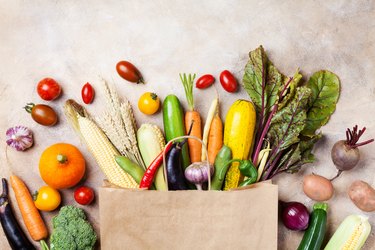
We're all familiar with "never go to the store hungry" and the perils that come with ignoring that advice (how'd that box of doughnuts end up in the cart?!). But there's a secret second part to the helpful saying that many people don't know: Never go to the store hungry... and always bring a grocery list.
Instead of wandering aimlessly through the aisles and forgetting the items you actually set foot in the store to buy, use this healthy grocery list — which was curated by two registered dietitians — as your starting point. Build your own personal list around these staples of a healthy diet (and remember to always read nutrition labels).
Your Healthy Grocery List
When it's time to restock your fridge and pantry, pick from these dietitian-approved items to help you build better meals:
Vegetables
- Dark, leafy greens: spinach, kale and lettuce
- Cruciferous veggies: broccoli, Brussels sprouts and cauliflower
- Starchy veggies: white and sweet potatoes, squash, corn and parsnips
- Non-starchy veggies: artichokes, peppers, mushrooms, eggplant and zucchini
"Vegetables provide a wealth of nutrients, including vitamins, minerals and the fiber that most of us are not getting enough of," Bonnie Taub-Dix, RDN, creator of BetterThanDieting.com, tells LIVESTRONG.com. Plus, they help prevent certain diseases and fill us up while providing many nutrients for fewer calories, she says.
Fruits
- Berries: strawberries, blueberries, raspberries, blackberries and unsweetened cranberries
- Stone fruits: peaches, plums, nectarines, apricots and cherries
- Citrus fruits: grapefruit, oranges and lemons
- Melons: cantaloupe, watermelon and honeydew
- Apples
- Pears
- Pomegranates
- Grapes
- Bananas
- Pineapples
- Avocados
Fresh, canned or frozen fruits and veggies all provide nutrients such as fiber and antioxidants but you have to read labels carefully to see what they're accompanied with, Taub-Dix warns. "For example, frozen berries could be a perfect addition to your smoothie, but if they're packed with added sugar like syrups, you might be better off with fresh or another brand."
Also, keep in mind that frozen produce can maintain more nutrients since it's frozen and packed at the peak of ripeness compared to off-season produce that is picked early or shipped long distances.
Think you're a grocery-shopping pro? Submit your healthy haul here for a chance to be featured on LIVESTRONG.com!
Whole Grains
- Steel-cut oats
- Sprouted whole-grain bread
- Brown rice
- Amaranth
- Teff
- Farro
- Buckwheat
- Barley
- Millet
Whole grains can help us lose weight because they take longer to digest break down and, therefore, are more satisfying — which can help us eat less overall, Taub-Dix says. "Just make sure that whole grains, such as '100-percent whole-wheat,' are listed first on the ingredient list. If the first ingredient just says 'wheat flour,' it could be white flour, which is stripped of nutrients."
Dairy and Eggs
- Low-fat unsweetened Greek yogurt and Icelandic-style skyr
- Low-fat dairy milk or plant-based milk
- Kefir
- Cheese: cottage cheese, goat cheese, feta cheese, part-skim mozzarella
- Grass-fed ghee and butter
- Pasture-raised eggs
"I buy plain regular and Greek yogurts, which I use in recipes and also in yogurt bowls," Frances Largeman-Roth, RDN, nutrition and wellness expert, author of Eating in Color and creator of the FLR VIP program, tells LIVESTRONG.com.
I avoid yogurt with artificial sweeteners and gums. Whole milk yogurt, especially the grass-fed variety, contains CLA (conjugated linoleic acid), a fatty acid that studies show can help burn fat, per a February 2015 study in Nutrition & Metabolism. What's more, grass-fed products contain more antioxidants than grain-fed animal products.
Meat and Seafood
- Grass-fed beef
- Poultry: chicken and turkey
- Fatty fish: salmon, herring, anchovies, mackerel and sardines
- Lean fish: trout, canned light tuna, tuna steaks, cod, flounder and halibut
"Like grass-fed dairy, beef and lamb contain CLA," Largeman-Roth says, adding that "grass-fed animals are particularly high in this omega-6 fat. I buy grass-fed, organic meat whenever possible."
And seafood is relatively low in calories, protein-packed and particularly nutrient-rich. Largeman-Roth always looks out for seafood that's wild-caught and sustainable. "When it comes to seafood, my first choice is Alaskan salmon because it's an excellent source of DHA omega-3 fatty acids, which are essential for brain and heart health," she says.
Nuts, Seeds and Legumes
- Almonds
- Hazelnuts
- Pistachios
- Walnuts
- Peanuts
- Sunflower seeds
- Quinoa (fun fact: quinoa is a seed)
- Beans
- Lentils
- Chickpeas
- Peas
- Organic soybeans
Nuts and seeds provide healthy fat and fiber and a wide range of vitamins and minerals. "Studies have shown that these healthy fats can help control blood sugar levels and boost heart health by reducing cholesterol levels," Taub-Dix says.
Meanwhile, "beans and legumes are the most under-valued foods in the supermarket that could certainly use some of your attention," she adds. "They are not only reasonably priced, easy to store and delicious, but they also provide a wealth of nutrients including satisfying complex carbs, fiber and plant-protein."
Healthy Oils
- Extra-virgin olive oil
- Avocado oil
- Canola oil
It's smart to sub out saturated fats with monounsaturated fats (MUFAs) such as olive oil, avocado oil and canola oil. "What's more, MUFAs help improve insulin sensitivity, which helps fight belly fat," Largeman-Roth says.
"Extra-virgin olive oil, which is mostly made up of MUFAs, is a key component of the Mediterranean diet, which studies show helps reduce disease risk and boost longevity," she adds. "And including olive oil in the diet regularly has been linked to a reduced risk of developing diabetes. Also, olive polyphenols have been shown to lower C-reactive protein, which is linked to inflammation in the body."

Get a printable version of this dietitian-recommended grocery list here.
Tip
Shop the perimeter, but don't neglect the middle. "It is important to shop the perimeter of the store where you’ll find produce and whole-grain bread, but it’s also important to 'make the most of the middle,' as I say, to get foods like beans, nuts, pasta and frozen foods," says Taub-Dix.
Now that you've got the gist of all the nutrient-dense foods you should stock up on, here's what to buy at five popular grocers to make the most of your healthy haul.
Become a Pro at Shopping Costco
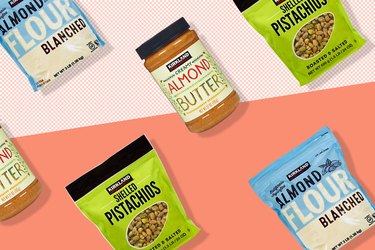
Costco's signature wide aisles store about 46,000 fewer products than your average supermarket, yet it's still daunting to decide which of the jumbo products won't have an equally enormous effect on your waistline.
But it turns out the warehouse store is actually home to many healthy foods, especially under its dedicated Kirkland Signature brand. Use our guide to help you steer the store's giant carts toward the healthiest picks.
Jot down these healthy foods at Costco to save cash and eat smart.
Your Go-To Trader Joe's List
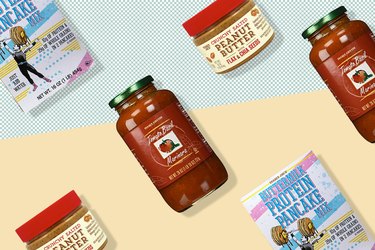
With a charming nautical theme and trend-setting products at reasonable prices, we're not surprised that Trader Joe's has built such a cult following since its 1967 opening.
You're likely to find your new favorite nut butter spread and pre-seasoned wild salmon at an affordable price tag at TJ's — along with plenty of nutritious eats you didn't even know you needed.
Bag these 10 surprisingly wholesome products that dietitians just can't get enough of.
What to Buy at Walmart
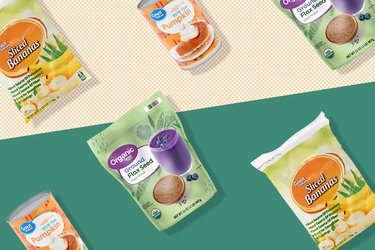
While Walmart carries everything from car parts to card tables, the superstore also sells a whopping 23 percent of the nation's groceries.
Next time you're stocking up on a new set of towels, take a peek at the grocery giant's dedicated Great Value brand — they sell everything from zero-added-sugar salsa to unsweetened Greek yogurt.
Shop for these Great Value products at your local Walmart — all under $8.
Healthy Finds at Target
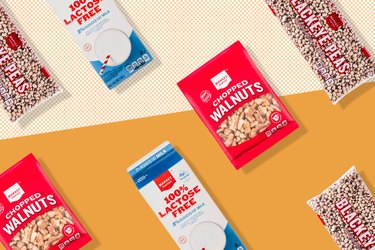
Target may be your one-stop shop for everything on your shopping list. But you probably never knew you could score nutritionist-approved meal prep essentials for cheap.
The bullseye brand's very own Market Pantry line features plenty of options — we're talking whole-grain bread and lactose-free milk — for less than $5.
Dietitians agree that these 11 Market Pantry items will benefit both your health and your wallet.
Shop These Kroger Steals
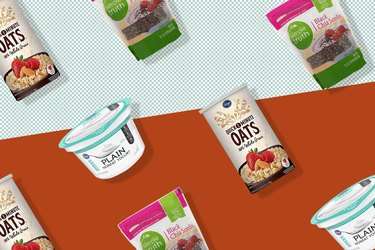
Kroger is the largest supermarket chain by revenue in America — a testament to their store-brand buys' value. To cut to the fill-the-cart chase at the grocer, we've narrowed down 10 healthy Kroger finds you'll want to keep stocked in your kitchen.
Add these 10 Kroger eats that are free of artificial sugars, dyes and preservatives to your cart.